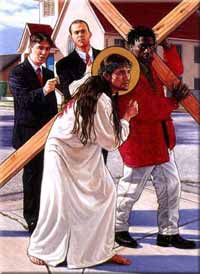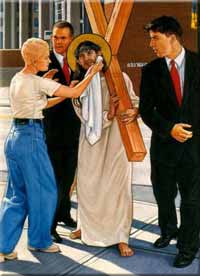The Bible speaks with remarkable frequency of "bearing." It is capable of expressing the whole work of Jesus Christ in this one word. "Surely he hath borne our griefs, and carried our sorrows...the chastisement of our peace was upon him" (Isa. 53:4-5). Therefore, the Bible can also characterize the whole life of the Christian as bearing the Cross. It is the fellowship of the Cross to experience the burden of the other. If one does not experience it, the fellowship he belongs to is not Christian. If any member refuses to bear that burden, he denies the law of Christ. -- Dietrich Bonhoeffer, Life Together
Once upon a time, during some interminable family holiday gathering where I wound up sitting cross-legged next to a bookcase and reading my much older cousins' books to combat my intolerable boredom (I was that kind of child), I came upon an interesting little tome all about child martyrdom. Each chapter was a fictionalized account of a child in a foreign land who wound up dying for his or her faith in Jesus -- killed by the godless Communists in Red China, killed by intolerant Muslims in an Arab country, and so on. Being a kid, and kids having a certain morbid fascination with blood, gore and heroism, I found the book quite inspiring. But the idea of suffering for one's faith seemed like something that happened to other people, far away.
And, really, that's where we like to keep suffering -- far away. That's where Peter wants to keep suffering, in our Gospel lesson today. He's just acclaimed Jesus as the Messiah -- in his mind, the great deliverer of Israel from the hated foreign oppressors and incompetent religious leaders, one who would usher in a new righteous kingdom of peace, prosperity and goodness. How strange, then, that Jesus should begin to talk about coming events -- suffering and even death at the hands of the authorities -- that didn't fit the conventional picture of Messiahship. It's no wonder that Peter should interrupt Jesus' gloomy prediction with what amounts to a prayer: "God forbid that such a thing should happen to you!"
What a shock it must have been to be rebuked so forcefully by Jesus -- the same Jesus who, not so long before, had called Peter a "rock"!
But Jesus was in the truth business. And one important truth he tried to impart here and elsewhere to his disciples was that God's people -- God's agents in the world -- will inevitably find themselves on the wrong side of those who are invested in the status quo. It happens every time. It even happens within the Church. As Jesus points out in his stern response to Peter, denying this truth about the inbreaking of the Reign of God is, in effect, "working for the other side"; it's abandoning one's charge to mend the broken places on God's behalf, and instead follow our own human tendency to choose complacency and even collaboration with what Walter Wink identifies as the "powers and principalities."
That's the big-picture, macro aspect of the Reign of God; facing the oppressive powers head-on and bearing the consequences. But the Reign comes down in innumerable individual acts of people bearing one another's burdens. Jesus models that; we read in the Gospels of Jesus seeing the needy crowds flocking to him, each individual with his or her own story of pain and need, and his being "moved with compassion" -- literally, "moved to the bowels"; gut-wrenched. When Jesus tells us to take up our crosses and follow him, he asks us to be willing to bear the weight of others' pain; of others' wrongdoing; of all the things about the people around us that may make us sad or angry or confused or uncomfortable. Bonhoeffer puts it this way: "To bear the burden of the other person means involvement with the created reality of the other, to accept and affirm it, and in bearing with it, to break through to the point where we take joy in it...to cherish no contempt for the sinner but rather to prize the privilege of bearing him means not to have to give him up as lost, to be able to accept him, to preserve fellowship with him through forgiveness."
This sounds like a pretty tough job. And it is. I once held a worldview that allowed me to define my own reality, which also allowed me to continually redraw the parameters of my engagement with others. It was a pretty convenient way to live; if some world situation or interpersonal friction displeased me, I could just walk away -- as long as I wasn't purposely injuring someone or something, no harm/no foul. After Christ came back for me, he wouldn't let me off the hook that easily. And I found that, ironically, my life hurt more, because I felt more. When the hollow eyes of the starving children stared at me from the TV screen, I was no longer able to just switch the channel; when the crazy lady in the supermarket parking lot started talking to me, I was no longer able to assume the urban-commuter stare and hurry past her.
It's a tough job, but not a job we have to bear alone. Because we know that Christ bears it with us. And, as Bonhoeffer points out, we who live in Christian community are being borne by others just as we are bearing them. There's a Jane Siberry song about how sometimes we pull the wagon and other times we're pulled along in the wagon by others, that always reminds me how it's supposed to go among the people of God. I often speak of intercessory prayer in terms of work; I wonder if any of us really appreciate what important work it is in the household of God.
Back in the summer before I started college, when my church youth group had a final summer picnic before we all scattered to our destinies, we played a volleyball game that turned into an "un-game" -- after awhile we got bored with keeping score, and decided instead to see how long we could keep the ball in play. Our very Ordnung muss sein pastor, increasingly disturbed by this subversive turn of events, became so agitated that his ears turned red -- something I hadn't seen since we disussed the 6th Commandment back in catechism class -- and he actually made us stop. "What is the point of playing a game," he demanded, "if there's no winner?" I suppose one could ask the same of those who claim Christ, as we insist on "losing" -- losing ourselves in giving ourselves to others even when it hurts, losing popularity contests in the public forum, seemingly losing again and again to everything that's wrong in the world. In the Gospel lesson for today Peter, too, operates from a paradigm where there is a clear "winner" on the world's terms. But what Christ tells him, and tells us, is that in God's Reign we win precisely when, from the world's perspective, we lose.
"Simon Helps Christ Carry the Cross," Chris Woods, Stations of the Cross


"Veronica Wipes Christ's Face," Chris Woods, Stations of the Cross


2 comments:
"Life in Christ, rather than simply comforting us or excusing us from the pain of this world, strengthens us to face what we fear most: suffering and death. Jesus does not turn from pain and loss; indeed, he offers strength and hope to his people.
"God's adoption of us in the waters of baptism and our communion in Christ's body and blood--signs of healing and community--strengthen us to offer ourselves as servants to a weary and frightened world."
Jane Sibbery?!? I haven't heard about her since probably the 80s!
I love her album "Bound By the Beauty"...best one, IMHO.
Post a Comment